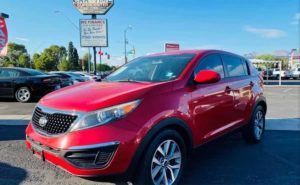The EV market remains small compared to the conventional gas-powered vehicle market. However, the steady growth of EVs means it’s becoming easier to find quality used EV cars for sale. There are many reasons to consider electric vehicles, from their environmental friendliness to the lower cost of ownership. No matter why you are interested in used EVs, understanding the upfront and long-range costs is essential.
Used EV Cars Are Less Expensive Than New Ones
Buying a used car instead of a new one offers several benefits. The most significant applies to conventional and electric vehicles—used cars are far less expensive. For the average driver, used EV cars for sale may be the only way to find affordable options. While it’s true that there are few new EVs under $30,000, some of the most significant price drops in the last year are in the EV market.
While used hybrids remain less expensive than EVs, electric used car prices have dropped from an average of $40,916 to $28,767 since June 2023. Fueling the EV price reductions are the many new electric models from Ford, Tesla, and other manufacturers. For budget-minded drivers, the best used EV cars include the Chevrolet Bolt, Hyundai Kona, and Kia Niro. The list of affordable pre-owned EVs will continue to grow, opening up the market to more buyers. However, upfront costs aren’t the only savings on the table.
Potential Savings and Tax Credits for Used EVs
Depending on the model, mileage, and condition, an EV used car will typically have a higher price tag than a comparable used gas-powered car. However, used EV cars for sale will also have a lower cost of ownership and a growing list of local, state, and federal EV incentives and credits.
EV Incentives
Federal and state incentives can reduce the initial cost of a used EV. The used clean vehicle credit allows drivers to recoup up to 30% of the sale price on their income taxes. Eligible EV models can recover up to $4,000, and, like every IRS credit, there are eligibility requirements. In addition to the EV used car tax credit, Arizona state EV initiatives are already in the works. The state’s plans include EV infrastructure, parking incentives, HOV lane exemptions, and other perks.
Maintenance and Repair Costs
The maintenance cost of used EV cars and trucks is typically lower than that of a gas-powered or hybrid vehicle. EVs feature regenerative brakes, which wear very slowly compared to conventional brakes. There is no oil-related maintenance and far fewer parts to maintain and repair compared to gas-powered vehicles. A recent car maintenance study reports owners can save up to 40 percent on EV maintenance and repairs. That savings can add up to thousands of dollars over the car’s lifespan!
Fuel Savings
If the savings from the IRS and fewer trips to the mechanic don’t entice you to take a test drive, consider EVs’ distinct selling point—they don’t use gas. Because there are no emissions, EVs are far healthier for the environment and the people in it. Because you don’t need to buy fuel, you can save thousands. According to the NREL, buying electricity instead of gas over a typical 15-year vehicle lifespan can save you up to $14,480. That savings is about $2,000 every year you drive your EV!
Used EV Cars and Battery Health
As they age, EV batteries gradually lose full-charging capability, decreasing their range. But don’t worry—because EV batteries degrade slowly, you won’t suddenly be stranded by the side of the road. Most EV batteries will last up to 20 years, and many new ones are warranted for eight years or 100,000 miles.
If you are looking for late-model used EV cars for sale, the batteries are probably still under warranty. However, you may find earlier EVs you like with expired battery warranties. Don’t let that expiration date scare you away. Expired doesn’t mean dead for EV batteries. Plus, EV manufacturers offer extended warranties for batteries and other components.
How to Test a Used EV Battery
Many electric vehicles feature onboard diagnostics that report real-time data on battery performance, including State of Health (SoH) status. SoH status indicates the battery’s charge capacity compared to its original capacity. While EV diagnostics reports are considered reliable, there are a few things you can do to double-check.
- Look up the model of interest and note the manufacturer’s maximum range. The online resource Electric Vehicle Database offers real-world data on EV battery range, energy consumption, and other essential specifications.
- Ask the seller to have the vehicle’s battery fully charged when you arrive. This step ensures an accurate comparison with your research and enough juice for a test drive. (Note: Many manufacturers recommend maintaining between a 30 and 80 percent charge.)
- After checking the SoH and noting the range, take the car for an extended test drive. Drive as you typically do, and don’t be afraid to put it through the paces!
- Check the range at the end of the test drive and compare it to the beginning range. Then, using Google Maps, compare the difference to the actual miles driven. If everything matches up, you’ll have all the information you need about your potential EV’s battery.
If you find the perfect EV and the battery is under warranty, that’s a win-win. If you find an EV and the battery is out of warranty, know that a new EV battery can cost $2,500 to $20,000 or more. Lucky for you, you know how to check battery health like a pro.
Car Time Supercenter: Tucson’s Trusted Resource for Used Vehicles
Save time and money when you shop for EVs at Tucson’s trusted family-owned dealership. Since 1985, Car Time Supercenter has offered quality used cars, trucks, and SUVs, competitive prices, flexible financing, and hometown customer care. Stop by for a test drive, and let us help you find the perfect used vehicle for your lifestyle.

There are good reasons people will buy their next used car in Tucson from Car Time Supercenter. But I think we are one of the most trusted used car dealerships mainly because we treat everyone like family. My family has provided quality, dependable local used cars to Tucson customers since 1984, and I’m proud to be a part of our continued success.
Like many family-owned businesses, I grew up going to work with my dad. Falling in love with cars was natural because of my father’s passion, and eventually, I came to love the car business just like him. I officially joined the Car Time Supercenter team in 2012, starting in the finance department. Over the past decade, I’ve learned the used car business and how to treat customers from my family and industry resources.
Today, I oversee marketing, social media, inventory, and reconditioning, so I play an essential role in delivering local Tucson used car buyers the best experience possible. I also help our family business keep up with the times while providing old-fashioned customer service. From attending NADA classes to becoming Allstate certified for back-end products, I continue to learn and add skills to serve our customers better.




